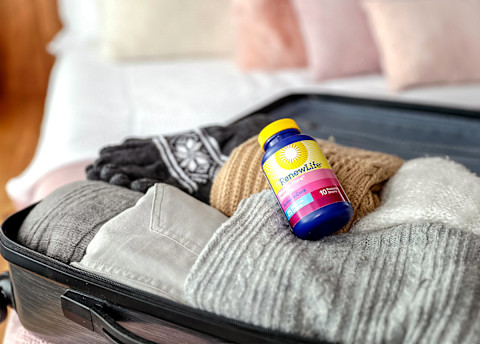Are Probiotics Actually Helpful Or Just Hype? A Microbiologist Explains The Science

If you Google "probiotics" right now, you'll get no fewer than 104 million verified search results on the topic. That's a ton of information—way more than you'd ever care to know—and the reality is we're still discovering more and more about probiotics every day.
Chances are, you probably have a few questions about probiotics—or bugs, as researcher Zac Lewis refers to them. Lewis holds a Ph.D. in microbiology and is currently a scientist at Renew Life, the company behind the No. 1 women's probiotic, so we tapped his expertise to answer the most common questions and clear up some misconceptions. Here's what he had to say.
First off, what exactly are probiotics? And what do most people tend to get wrong about them?
I think lots of people understand that probiotics are "good for you," but they maybe don't really know what a probiotic is. Probiotics are formally defined as "live microorganisms that, when administered in adequate amounts, confer a health benefit on the host." That means that probiotics have to be alive, they have to be at the right dose, and there needs to be proof that they help your health; otherwise, they're not probiotics but something else.

If a product has dead bugs in it, it's not a probiotic. If it's just fairy dust amounts of live bugs that aren't effective, it's not a probiotic. If it has no proof that it helps you, it isn't a probiotic. That proof usually needs to be from a rigorous clinical trial that shows the live microbe works better than an inactive sugar pill, aka a placebo.
What's the science behind how a probiotic supplement works?
Probiotics can work in different ways. Some types—or "strains" in science-speak—work by talking to your immune system in specific ways that make you more resistant to challenges. Some calm down an immune system that is overreacting to things it doesn't need to. Others work by interacting with your digestive tract to affect the speed at which food moves through you—it's never pleasant to have your gut working too fast or too slow! Some strains work by settling down in your intestines and helping to crowd out bad bugs by taking up all the space and eating all the bad bugs' favorite foods. Some even actively kill the bad bugs for you!
If you're buying a probiotic, what's the most important information on a probiotic's bottle?
There are a couple of things people can look for as signs of quality. First, there is the total amount of probiotics in the product. Just like temperature is measured in degrees, you measure probiotics in colony-forming units (or CFUs). Sometimes people refer to CFUs as cultures as well.
The CFU levels on a product report the dose of probiotics you are getting, which can help tell you whether your product will be effective since clinical trials usually show what dose is needed for a product to work. Renew Life products, for example, deliver billions of CFUs.
Another thing to look for is a statement that the CFUs are guaranteed through the date of expiration and not just at the time of manufacture. You wouldn't care if your milk was just fine when it went into the carton if it was spoiled by the time you brought it home, would you? Well, dead bugs aren't even probiotics anymore, so a quality probiotic brand will make sure that the bugs are alive when you take the product home.
You can also look at the list of the probiotics themselves. Different strains can offer different benefits, so products containing multiple strains may be able to offer you more benefits. You also want to use the right bug for the type of benefit you want. Just like German shepherd dogs make good guard dogs and chihuahuas make good lap dogs but not vice versa, you wouldn't want to use a probiotic native to your mouth to solve occasional constipation, and you don't want to use a strain that colonizes the large intestine if you want to support your vaginal health.
Is there a right way to take probiotics? A right way to store them?
The most important factor in taking probiotics is that you actually take them! This means you should find a time of day when you can incorporate taking your supplement into your routine so that you remember to do it every day.

As far as storage, you should follow the directions on the packaging. Some probiotics require refrigeration, and most would benefit from refrigeration since it keeps them fresh. However, some products are formulated to be shelf stable and can be kept at room temperature on your table, in your medicine cabinet, or in your purse for on-the-go use!
Other than generally feeling better, is there another way to tell whether or not a probiotic is working?
It depends on what the probiotic is supposed to do for you! Sometimes probiotics are taken to fix a problem you already have, like occasional constipation. In that case, it'll be obvious when a product is working.
However, sometimes probiotics help with things that are more preventive by helping you maintain health, such as by preventing future respiratory tract problems or future occasional diarrhea. The proof that it is working is that you experience fewer disruptions over time. The best efficacy assurance you can have before buying the product is knowing that it is backed by rigorous clinical trials that you can trust.
What's the most exciting thing, in your opinion, happening in gut health right now? Any interesting innovations?
By far the most exciting things happening right now in my opinion are in the "microbiome" field. A microbiome refers to the microorganisms in an environment. There are around 40 trillion bacteria living in and on each and every person, which is about as many human cells as a person has! Scientists are quickly figuring out what types of microbes there are in our microbiomes and what they're doing.

When you compare people with specific problems to people without those problems, you often find that they have different "communities" of microorganisms in or on them. We aren't always sure whether the sickness causes microbiome differences or microbiome differences cause the sicknesses, but there is a lot of potential to help people through making changes in the microbial community.
I like to compare the human microbiome to other "ecosystems" that people are more familiar with. Where one person might have a lush tropical jungle-like microbial community in them, another person might have a barren desert-like microbial community in comparison. We're discovering that different microbes play different roles in their community and that a healthy microbiome requires balance.
How do you know if a microbiome is balanced?
So just as cows need plants to eat, wolves can help keep deer populations under control, and plants need bees to help pollinate flowers, different microbes prefer different foods, and healthy functional microbiomes need lots of different species competing and cooperating to be stable. Diversity is usually a good thing for an ecosystem to have!
